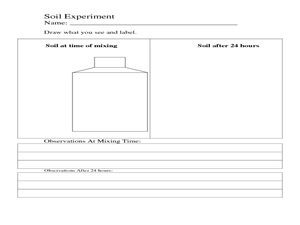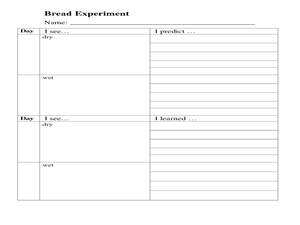Curated OER
Autumn
Take a walk through the forest as the leaves change color and fall from the trees, making way for a new ecosystem cycle to cycle through. An inquiry-based lesson plan examines how the process of decomposition eliminates tons of...
Curated OER
Forest Fires
Students discuss the benefits and problems associated with fire. They discuss the role that fire plays in maintaining healthy ecosystems. Students brainstorm ways that fire can be harmful, such as damaging homes, communities, and...
Curated OER
Under Our Feet
Students investigate the forest ecosystem to learn of the living and non-living elements of the soil. In this ecosystem lesson, students examine soil for twigs, moss, fungi, leaves, roots and other matter. Students...
Curated OER
Insect Pitfall Traps
Students ask testable questions, use the inquiry cycle to investigate, gather data and interpret the results, study the diversity of insects and other smallorganisms which live around the school; they can make an inventory /collection of...
Polar Trec
Arctic Smorgasbord!
Two blooms of phytoplankton, instead of just one, now occur in the Arctic due to declining sea ice, which will have widespread effects on the marine life and climate. In small groups, participants build an Arctic food web with given...
College Board
2010 AP® Environmental Science Free-Response Questions
Scientists rely heavily on data to make predictions and find solutions. Young scholars become scientists as they analyze information presented to them to construct responses. They consider scenarios related to air pollution, invasive...
Alabama Wildlife Federation
Forest Floor Investigation
Most living things go unnoticed. Change that using a fun activity about the nutrient cycle. Pupils use hula hoops to mark areas of study and then make observations about the living things they see. They first make surface observations,...
Curated OER
Forest Decomposition
Students explore decomposition. Students define and describe components of the decomposition process. Students make a composter in a terrarium. Students record observations and changes weekly, drawing conclusions about the results...
Curated OER
"Habitats"
Students complete a unit of lessons on animals and animal conservation. They observe a square meter of ground outside the school, set up a model environment, analyze an owl pellet, grow bread mold, and explore various websites.
Curated OER
Webbing the Food Chain
Students compose a visual representation of the food chain cycle using Inspiration educational software.
Curated OER
Water Quality and Temperature
Students are led through three activities to explore the effect of temperature fluctuations on the growth and survival of aquatic plants, clams, and shrimp eggs.
Curated OER
Our Schoolsyard is Full of Biology
Students study the habitats found in their schoolyard. They apply firsthand, what they have learned in the classroom to something familiar to them. Students look at biotic, abiotic habitats. Small groups will present their findings to...
Curated OER
Biology Vocabulary
In this biology worksheet, learners identify and locate various vocabulary terms pertaining to food webs and animal species. There are 52 biology terms located in the word search.
Curated OER
Vermicomposting
Third graders study vermicomposting. In this vermicomposting lesson, 3rd graders prepare to begin a unit on decomposition by constructing a worm bin. Students collect worms to be used later in experiments.
Curated OER
Predator and Prey Game
Students explore the why the balance among producers, predators and prey is necessary in order for an ecosystem to be sustained over time. Through web games and activities, they discover how each component of the food chain works to...
Curated OER
Recyclers Revisited
Fifth graders observe their plant experiments that they started in a previous lesson and examine the role of decomposers in the nitrogen cycle. Two weeks after they set up a worm terrarium, they analyze any changes they observe, and...
Curated OER
My Biotic Creation
Eighth graders explore different ecosystems. In this ecosystem survival lesson conditions lesson students create their own fictional creature.
Curated OER
Ecology and the Conservation of Natural Resources Lesson 2
Students compare and contrast abiotic and biotic factors. They discuss how these factors effect ecosystems. They answer questions to complete the lesson.
Curated OER
What Do Snails Eat?
Students conduct a food choice experiment with snails, recording the results on a chart to determine what snails eat. For this what do snails eat lesson, students color a picture of snail anatomy, perform the experiment with 3 food...
Curated OER
Wetlands - Food Web Relationships
In this food web relationships activity, students click on the links to learn about the food web relationships in the wetlands and answer short answer questions about it. Students complete 8 questions total.
Curated OER
Magical Images of the Estuary
Students investigate picture taking techniques while visiting an estuary. In this picture taking lesson, students examine the "Magical Images of the Estuary" handout. They think of and list important picture taking techniques before...
Curated OER
Autumn
Students examine the cycle of nutrients in a forest. They research the concepts of decomposing and recycling within a forest.
Curated OER
Ecological Citizen
Students examine the interconnectedness of living and non-living things that constitute an ecosystem. They examine fallen trees,insects, living trees, leaves, food webs, and forests. They conduct various activities and write poems about...
Curated OER
Introduction to Worm Bin Project
Students observe the decomposing process of the food chain in a worm bin. They observe whether the type of food fed to worms affect the castings given off during the decomposition process. They learn and practice graphing their findings.

























